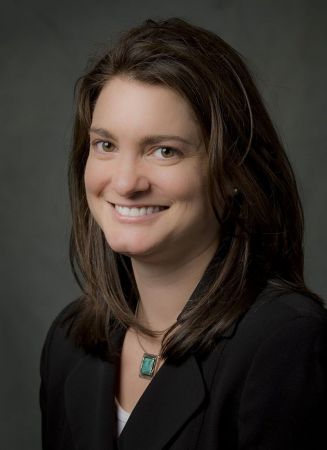The ultimate goal of Dr. Jellison’s research is the prevention of waterborne disease. She strives to achieve this goal from two different, but complementary, approaches: (i) the protection of drinking water sources from contamination with waterborne pathogens and (ii) the design/optimization of household water treatment technologies appropriate for use in developing countries.
Jellison's research team focuses on environmental sources, fate, and transport of Cryptosporidium, a protozoan parasite responsible for waterborne outbreaks of cryptosporidiosis -- a self-limiting illness in otherwise healthy people that can be prolonged and life-threatening for the immunocompromised population. The team's research in the area of household drinking water treatment focuses on simple technologies like biosand filtration, ceramic pot filtration, and chlorination. She is working to optimize such technologies and standardize their operating procedures to make them more effective, affordable, and available to a larger global population.
Dr. Jellison is recipient of a CAREER Award from the National Science Foundation, and her research is also supported by U.S. Environmental Protection Agency, the Lindbergh Foundation, Pennsylvania State University, the Pennsylvania Department of Community and Economic Development, and the Philadelphia Water Department. She is a member of the American Society for Microbiology, the American Water Works Association, the American Chemical Society, the American Association for the Advancement of Science, Sigma Xi, and the Association of Environmental Engineering and Science Professors. She is also a co-adviser of Lehigh's Engineers Without Borders Program.
Teaching and Service
Dr. Jellison teaches Introduction to Environmental Engineering, Enviro-Geo-Hydraulics Lab, Environmental Case Studies, and Water and Wastewater Treatment Facilities.
Dr. Jellison will assume the directorship of Lehigh’s NSF-ADVANCE grant in June 2013. She is a member of the American Society for Microbiology, the American Water Works Association, the American Chemical Society, the American Association for the Advancement of Science, Sigma Xi, and the Association of Environmental Engineering and Science Professors. She is also a co-adviser of Lehigh’s Engineers Without Borders Program.
Selected Publications
Lantagne, D., Preston, K., Blanton, E., Kotlarz, N., Gezagehn, H., van Dusen, E., Berens, J., and Jellison, K. (2011) Sodium hypochlorite expiry and stability in household water treatment in developing countries. ASCE Journal of Environmental Engineering 137(2): 131-136.
Lantagne, D., Klarman, M., Mayer, A., Preston, K., Napotnik, J., and Jellison, K. (2010) Effect of production variables on microbiological removal in locally-produced ceramic filters for household water treatment. International Journal of Environmental Health Research 20(3): 171-187.
Wolyniak, E.A., Hargreaves, B.R., and Jellison, K.L. (2010) Seasonal retention and release of Cryptosporidium parvum oocysts by environmental biofilms in the laboratory. Applied and Environmental Microbiology 76(4): 1021-1027.
Preston, K., Lantagne, D., Kotlarz, N., and Jellison, K. (2010) Turbidity and chlorine demand reduction using alum and moringa flocculation before household chlorination in developing countries. Journal of Water and Health 8(1): 60-70.
Jellison, K. (2010) Canada geese: Tranquil symbol of the wild or pathogen carrier? Opflow August 2010: 16-18.
Wolyniak, E.A., Hargreaves, B.R., and Jellison, K.L. (2009) Retention and release of Cryptosporidium parvum oocysts by experimental biofilms composed of a natural stream microbial community. Applied and Environmental Microbiology 75(13): 4624-4626.
Jellison, K.L., Lynch, A.E., and Ziemann, J.M. (2009) Source tracking identifies deer and geese as vectors of human-infectious Cryptosporidium genotypes in an urban/suburban watershed. Environmental Science and Technology 43(12): 4267-4272.
Kotlarz, N., Lantagne, D., Preston, K., and Jellison, K.L. (2009) Turbidity and chlorine demand reduction using locally available physical water clarification mechanisms before household chlorination in developing countries. Journal of Water and Health 7(3): 497-506.
Connelly, S.J., Wolyniak, E.A., Williamson, C.E., and Jellison, K.L. (2007) Artificial UV-B and solar radiation reduce in vitro infectivity of the human pathogen Cryptosporidium parvum. Environmental Science and Technology 41(20): 7101-7106.
Connelly, S.J., Wolyniak, E.A., Dieter, K.L., Williamson, C.E., and Jellison, K.L. (2007) Impact of zooplankton grazing on the excystation, viability, or infectivity of the protozoan pathogens Cryptosporidium parvum and Giardia lamblia. Applied and Environmental Microbiology 73(22): 7277-7282.
Grudzinski-Hall, M., Jellison, K.L., Stewart-Gambino, H., Weisman R. (2007) Engineering students in a global world: Lehigh University's Global Citizenship Program. Online Journal for Global Engineering Education 2(1): Article 1.
Jellison, K. L., Distel, D. L., Hemond, H. F., and Schauer, D. B. (2007) Phylogenetic analysis implicates birds as a source of Cryptosporidium spp. oocysts in agricultural watersheds. Environmental Science and Technology, in press. (See news release about this publication)
Jellison, K. L., Distel, D. L., Hemond, H. F., and Schauer, D. B. (2004). Phylogenetic analysis of the hypervariable region of the 18S rRNA gene of Cryptosporidium spp. oocysts in the feces of Canada geese (Branta canadensis): evidence for five novel genotypes. Applied and Environmental Microbiology 70(1): 452-458.
Jellison, K. L., Hemond, H. F., and Schauer, D. B. (2002). Sources and species of Cryptosporidium oocysts in the Wachusett Reservoir Watershed. Applied and Environmental Microbiology 68(2): 569-575.
Jellison, K.L., Dick, R. I., and Weber-Shirk, M. L. (2000). Enhanced ripening of slow sand filters. ASCE Journal of Environmental Engineering 126(12): 1153-1157.
Related News

